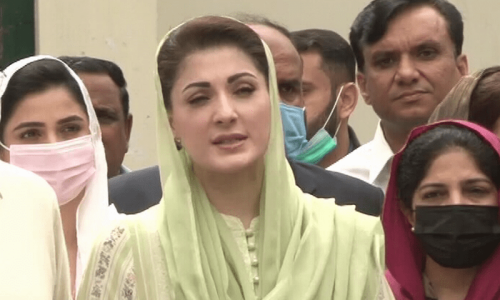ISLAMABAD: The Supreme Court will take up on Tuesday an appeal of National Accountability Bureau (NAB) chairman Javed Iqbal challenging the transfer of Al-Azizia/Hill Metal and Flagship Investment references against ousted prime minister Nawaz Sharif from one accountability court to another.
A three-judge bench comprising Chief Justice of Pakistan Mian Saqib Nisar, Justice Umar Ata Bandial and Justice Ijaz-ul-Ahsan will begin hearing the plea filed by NAB against the order of the Islamabad High Court that transferred the two references against Nawaz Sharif, his daughter Maryam and son-in-law retired Captain Mohammad Safdar from Judge Mohammad Bashir to Judge Mohammad Arshad Malik of the accountability court on Aug 7.
The Sharifs were sent to jail by Judge Mohammad Bashir in another reference pertaining to Avenfield apartments on July 6.
Ousted PM, Judge Bashir respondents in NAB petition against IHC order
Both the former prime minister and Judge Mohammad Bashir are respondents in the NAB petition.
Earlier on Sept 18, an SC bench, headed by the CJP, had rejected a NAB’s petition by not only dubbing it ‘frivolous’ but also slapping a fine of Rs20,000 as to be deposited by NAB in the Pakistan Diamer-Bhasha and Mohmand Dams Fund. The previous plea had been moved against the IHC’s decision to hear petitions of the Sharifs against the suspension of sentences awarded to the ousted PM, his daughter and son-in-law by the accountability court in the Avenfield apartments reference.
A day after the rejection of NAB’s plea by the apex court, the IHC suspended their jail term till a decision on the petitions filed by the Sharifs and ordered their release from Adiala jail.
No bias highlighted against judge: NAB
In its fresh appeal, NAB argued that the IHC fell into grave error by transferring the two references when no actual and specific bias or prejudice was highlighted against the earlier accountability court judge.
The petition pleaded that none of the reasons spelled out in the short order of the IHC of transferring the trial to another court were germane to the case law on the subject of the transfer of cases. In fact, the petition argued, they are not akin to the grounds and causes of such action.
NAB highlighted that the references against the Sharifs were filed before Judge Mohammad Bashir of the Islamabad accountability court in compliance with the SC directions on recommendations of the Panamagate Joint Investigations Team (JIT), headed by Wajid Zia.
The commonality of grounds in all the references had never been visualized by the superior courts for the transfer of the cases, NAB argued. The perceived notion attributed to the accountability judge was not tenable in law related to the transfer of cases, it pleaded.
Questioning the high court order, the appeal pleaded whether or not it was imperative and in the interest of justice, fair play and equality that the trial court judge, who had earlier recorded depositions of witnesses and seen their demeanour, was better equipped to understand testimonies in the related references.
The petitioner also asked whether the grounds raised in the applications for transfer of cases were in accordance with the law and canons of justice and could be made a ground for the transfer of the reference.
The bureau questioned whether the respondents (Sharifs) had ever raised objection to neutrality of the accountability judge during the trial and whether or not their fresh application for the transfer of the cases before the high court was not a ploy to prolong and protract the proceedings by depriving the parties from the right of a fair trial as envisaged under Article 10-A of the Constitution.
The appeal argued that the successor judge (Judge Mohammad Arshad Malik) would neither be acquainted with the earlier proceedings nor would be fully aware of the demeanour of the witnesses and arguments made on different miscellaneous applications.
The appeal asked if the high court could at all look into the merits of the case while dealing with the transfer applications. It further questioned whether or not the transfer order was against the established norms of justice and principles of the transfer of cases.
Published in Dawn, September 23rd, 2018















































